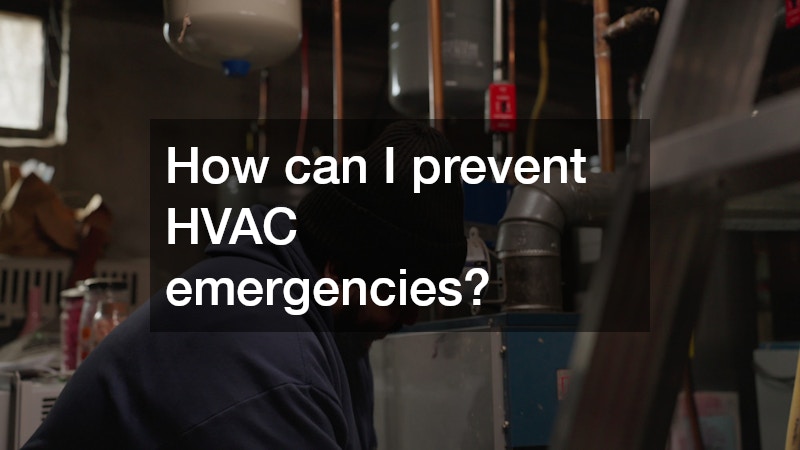Understanding when to call an emergency HVAC service can prevent discomfort and additional damage to your heating, ventilation, and air conditioning systems. This article discusses the key indicators that you need immediate assistance.
How do I know if my HVAC system needs emergency repair?
Unusual Noises
Strange noises, such as grinding, squealing, or banging, can be an ominous sign of an issue within your HVAC system. These sounds often indicate mechanical problems or parts that are coming loose.
Ignoring these noises can lead to more significant damage and costly repairs down the line. Therefore, addressing them promptly with professional assistance can save time and money.
Even if the system continues to operate, these noises indicate that the system might be struggling internally. Immediate action can prevent a complete system breakdown.
Lack of Airflow
Weak or inconsistent airflow is a common hint that something is wrong with your HVAC system. It may result from a clogged filter, ductwork issues, or a malfunctioning unit.
This symptom calls for quick intervention as it impacts the system’s efficiency and your home’s comfort level. Professional inspection can pinpoint and resolve the issue promptly.
Additionally, restricted airflow can exacerbate wear and tear on the HVAC components, leading to a shortened system lifespan. Addressing this issue quickly helps maintain system longevity.
What are the signs of a failing HVAC system?
Inadequate Heating or Cooling
If your HVAC system fails to maintain designated temperatures, it might be time for an emergency service call. Such inefficiencies could stem from impaired components or calibration errors in the system.
Temperature inconsistencies can uncomfortably alter your home environment, necessitating professional diagnostics to restore comfort. Rapid attention ensures a return to optimal system performance.
Continued operation under these conditions can cause extended strain, leading to more critical failures. Proactive intervention reduces the likelihood of expansive system repairs.
High Energy Bills
A significant rise in energy expenses often signals that your HVAC system is struggling to operate efficiently. An aging or malfunctioning system can consume more power, reflected in your utility bills.
This financial burden might be avoided by professional HVAC diagnostics, which can identify and rectify operational inefficiencies. Timely service minimizes unnecessary energy expenditure.
Comparing recent bills with records can help you detect these anomalies early. This practice, combined with professional assessments, can maintain lower operational costs.
Why does my HVAC system keep cycling on and off?
Thermostat Issues
A thermostat malfunction can cause your HVAC system to cycle on and off frequently, known as short cycling. This condition stresses the system as it continually powers up and down.
Short cycling might be a result of a faulty thermostat or poor system calibration, which needs immediate attention. Addressing this issue promptly prevents further damage to your HVAC unit.
Effective thermostat functioning is crucial for energy efficiency and providing consistent comfort. Ensuring it operates correctly greatly enhances your system’s performance.
Refrigerant Leaks
Refrigerant leaks are a serious issue that can lead to significant operational disruptions in your HVAC system. Such leaks impact cooling efficiency and can cause the system to overheat.
If you notice a hissing sound or reduced cooling output, it could be indicative of a refrigerant leak. Professional intervention is required to determine and resolve refrigerant issues.
Delayed response to refrigerant leaks can result in extensive damage, requiring more exhaustive repairs. Timely identification maintains the system’s cooling capacity and integrity.
When should I call for emergency HVAC service during extreme weather?
Health Risks of Extreme Cold
During freezing temperatures, a failing HVAC system can expose you and your family to dangerous health risks. Inadequate heating compromises indoor comfort and safety levels.
Prompt emergency service ensures that your living environment remains safe and comfortable, preventing cold-related health issues. It is vital to address heating deficiencies during winter immediately.
Ignoring HVAC problems during extreme cold can jeopardize more than comfort; it can escalate into property and health hazards. Emergency HVAC services play a critical role in mitigating these risks.
Risks During High Heat
In severe heat, an operational failure in your HVAC system can quickly cause indoor temperatures to rise to dangerous levels. This condition is uncomfortable and potentially hazardous, especially to vulnerable populations.
Calling for emergency repair in such instances is critical to mitigate health risks and ensure safety. Quick action restores a livable environment and maintains the HVAC system’s performance.
Maintaining optimal indoor temperatures during heat waves is essential for both comfort and health. Relying on skilled professionals ensures minimal downtime in the face of HVAC failures.
How can I prevent HVAC emergencies?
Regular Maintenance
Scheduling regular maintenance checks is a proactive approach to detecting and resolving potential HVAC issues early. These checks keep your system running efficiently and prevent sudden breakdowns.
Professional maintenance offers comprehensive insights into the health of your HVAC system and suggests necessary adjustments. Routine checks extend the system’s operational lifespan and improve efficiency.
By adhering to recommended maintenance schedules, you can minimize the risk of emergencies. Consistent care improves overall system reliability and performance.
Timely Repairs
Addressing minor HVAC issues promptly can forestall them from turning into emergencies. Quick repairs maintain system integrity and prevent further complications.
Regular inspections that identify and resolve small issues enhance the dependability of your HVAC system. Timely intervention ensures ongoing system functionality and household comfort.
Neglecting minor repairs can lead to system inefficiencies and larger issues down the road. Emphasizing timely repairs safeguards your investment and avoids costly emergencies.




